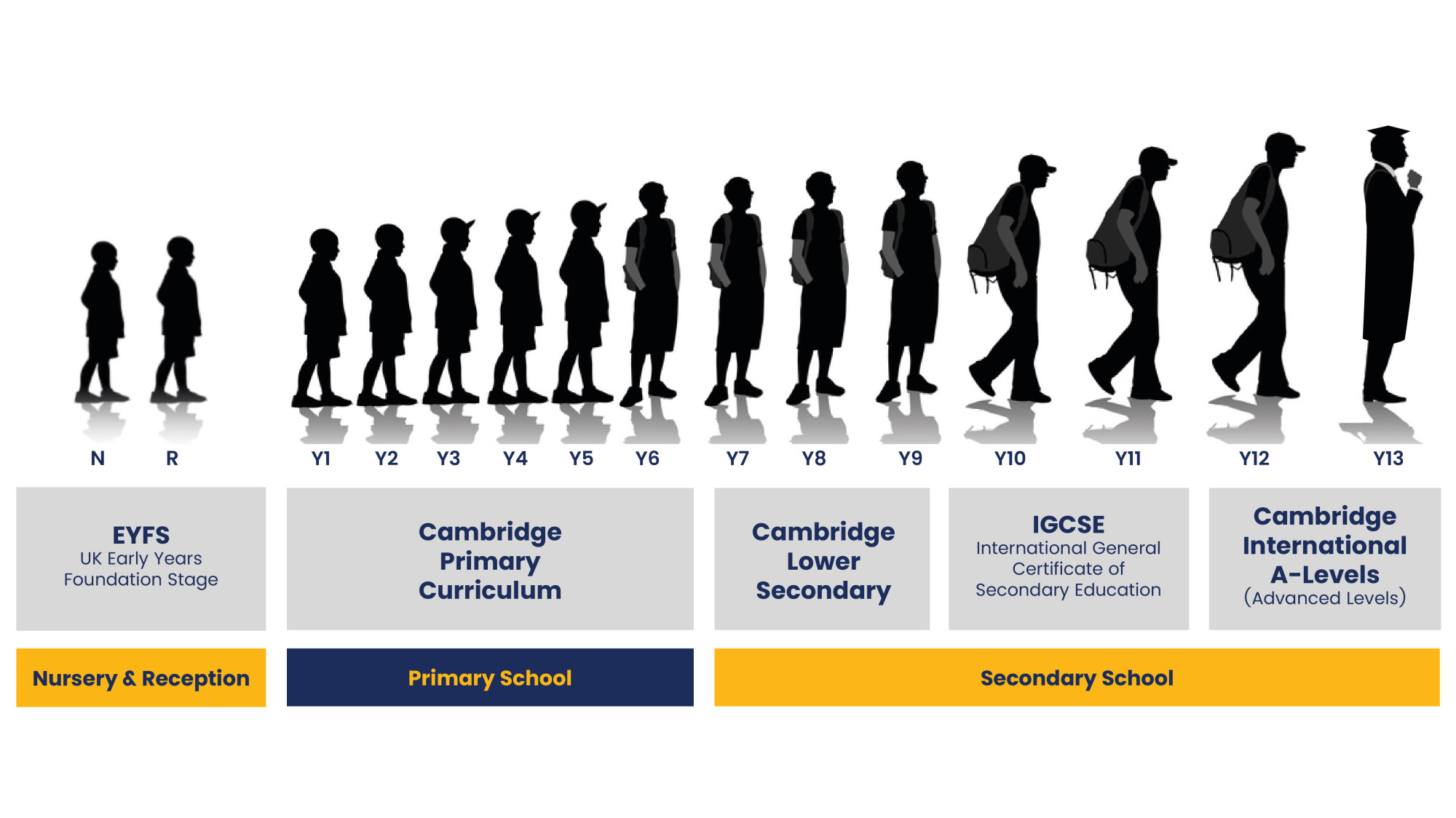- 092 222 868 (KH, ENG)
- info@invictus.edu.kh
- Cambodia
Private School in Cambodia
Academic Curriculum
Welcome to Invictus International School. Invictus is a group of schools that has expanded regionally to meet the demands of modern 21st Century education in a constantly changing world.
Our mission to be a leading educational institution, where all learners develop holistically and are given every opportunity to be successful, can be seen by the diverse student-centered approach and the curricula we offer at Invictus.

Learning Journey in Invictus International School
 | The UK Early Years Foundation Stage (EYFS)The UK Early Years Foundation Stage (EYFS) curriculum fosters learning and development through giving each unique child the opportunity to build positive relationships and find themselves in enabling environments. The first theme of the UK EYFS has educators understand that every child is a unique child, who is constantly learning and can be resilient, capable, confident and self-assured. Teachers will take time to understand and observe each child’s development and learning, assess progress, and plan for next steps. Next, children learn to be strong and independent through positive relationships. Positive relationships are fostered by teachers who are sensitive and responsive to the child’s needs, feelings and interests. The last theme in the UK EYFS curriculum is enabling environments where children learn and develop through encouraging feedback. This is where their experiences reflect their individual needs and there is a strong partnership between practitioners and parents/guardians. |
 | Cambridge Primary CurriculumThe Cambridge Primary Curriculum provides a broad and balanced education for young learners, helping them to thrive throughout their schooling, work and life. This flexible curriculum ensures that learning is adapted to the child, and prepares them for Secondary Cambridge Curriculum. For more information about the Cambridge Primary, please visit: https://www.cambridgeinternational.org/programmes-and-qualifications/cambridge-primary/curriculum/. |
 | Singapore Mathematics (Primary)The Singapore Mathematics model is well-known internationally and has been adapted for use in at least 25 countries, including the USA and Britain. It is a very successful teaching approach which focuses on problem-solving and heuristics. Children are taught the 3 step learning process whereby they move from the concrete to pictorial and abstract. Students engage in hands-on authentic learning experience whereby they actually feel and see the objects. This will then be followed by drawing pictorial representations of mathematical concepts, before proceeding to solving mathematical problems in an abstract way. The focus is on teaching students problem-solving capabilities, as well as practical and critical thinking skills that will help them solve problems in the real world. The curriculum is also based on the Concrete Pictorial Abstract (CPA) approach which posits that people learn in three stages: through real objects, pictures and then symbols such as plus and minus signs. The CPA is well known for modelling mathematical problems with visual aids to build an understanding of concepts such as fractions, ratios and algebraic reasoning in a systematic way. |
 | Cambridge Secondary CurriculumThe Cambridge Secondary Curriculum is used in over 155 schools in over 50 countries worldwide. Cambridge Secondary Curriculum is jointly developed by the London-based Fieldwork Education and front-line educators from more than 100 international schools around the world, including the UK, the US and Australia. It is an international course in the true sense. The Cambridge Secondary Curriculum is a concepts based curriculum design that provides theme-based units featuring learning goals that outline the knowledge, skills and understanding needed across all subjects as well as developing personal dispositions to help students become more internationally minded. The Cambridge Secondary Curriculum promotes learner traits recognised as essential for future success. The full range of units cover adaptability, balance, belief, celebration, challenge, collaboration, communication, community, competition, consequences, courage, creativity, curiosity, development, discovery, entrepreneurship, identity, interpretation, justice, leadership, reflection, relationship, renewal, resilience, resolution, respect, responsibility, risk, structures and tradition. For more information about the lower secondary program, please visit: |
 | International General Certificate of Secondary Education (IGCSE)The Cambridge IGCSE is the world’s most popular international qualification. IGCSEs is a preparation for the Cambridge International A-Levels, and usually take two years to complete. Assessment ranges from written to oral tests, as well as practical exams and coursework. Students get to choose from a range of different subjects. The final results are assessed using internationally-recognised A* to G grades. The exam papers are all marked centrally in the UK. The Cambridge IGCSEs give you the freedom to choose a course of study that is right for you. Your chosen subjects should fit with your career goals or plans for further education. For more information about the lower secondary program, please visit: Speak with our admissions representative to know which courses are available at Invictus for your selection. |
 | Cambridge International A-levels (Advanced Level)The Cambridge International A-Level (Advanced Level) is a subject-based qualification conferred as part of the General Certificate of Education, as well as a High school completion qualification offered by established examination boards in the United Kingdom, with more than 55 subject choices available to choose from. Considered the 'Gold Standard' qualification. Obtaining an A-Level is generally required for university entrance, with universities granting offers based on grades achieved. Cambridge International A-Levels generally take two years to complete. Students normally take 3-4 A-Levels in their first year, and most cut back to 3 in their second year. This is because university offers are normally based on 3 A-Levels. Unlike other level 3 qualifications such as the International Baccalaureate, A-Levels have no specific subject requirements, so students have the opportunity to combine any subjects they wish to take. However, students normally pick their courses based on the degree they wish to pursue at university: most degrees require specific A-Levels for entry. For more information about the A-levels, please visit: Speak with our admissions representative to know which courses are available at Invictus for your selection. |